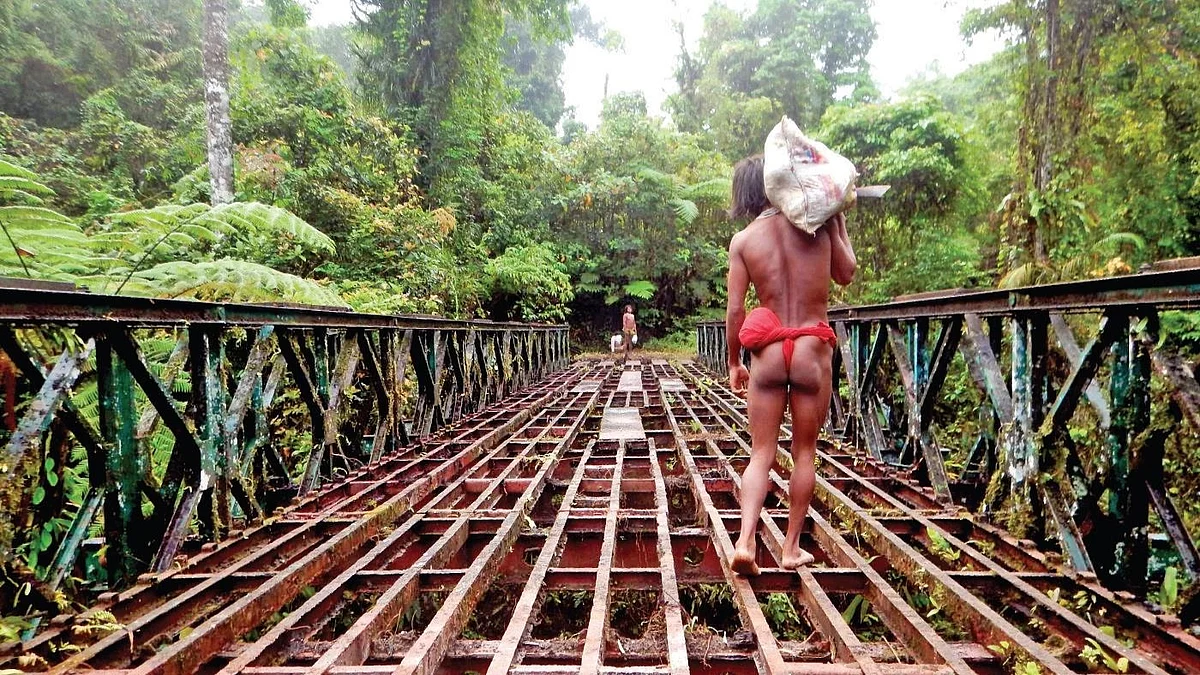‘No environmental impact, no tribal displacement’ from Great Nicobar project?
Tribal affairs minister Jual Oram told the Rajya Sabha in response to Congress’ Jairam Ramesh and TMC’s Saket Gokhale that no objection from any anthropologist was "available" to the GoI

There will be no environmental impact and no "tribal" will be displaced due to the Great Nicobar project, tribal affairs minister Jual Oram claimed in the Rajya Sabha, while asserting that the project is important for the country owing to its "strategic location".
Oram said this while replying to supplementaries during Question Hour after several opposition members raised objections to the minister not giving a written reply to the question on tribes that are expected to be relocated as part of the project.
He pointed to China "sitting" in Hambantota, in Sri Lanka, and asked "Why should India leave our land?"
It was an odd question, for certainly no one in the opposition (or otherwise) had proposed that the local tribes were other than Indian citizens or called for them to vacate.
"This project is very important socio-economically and commercially in the interest of the country. We are merely 40 km away from the sea route. That is why we cannot leave this," the tribal affairs minister argued.
TMC member Saket Gokhale and Congress' Jairam Ramesh asked why the minister had not replied to the questions raised in writing.
Gokhale had asked about action taken on concerns raised by the National Green Tribunal (NGT) and the National Commission for Scheduled Tribes (NCST) over the effect on local tribal communities of the environmental and forest clearances granted for the Great Nicobar project.
Gokhale also noted that there are only 229 members of the Shompen tribe living in the world — clearly, care was called for?
Oram responded that after the 2004 tsunami struck the island, because of the vulnerability of the low-lying areas, several tribal groups had shifted out — this, he implied, was all the ‘displacement’.
A high-powered committee has been formed after the NGT decision and work is being carried out as per the NGT orders, he told the House.
"You know me personally as I was behind a company like POSCO. This Narendra Modi government will never go against the tribals. Not even a single tribal is being displaced and there is no impact on the environment. We are moving as per orders of court," he said.
"There is no environmental impact due to this. It is a win-win situation and there are only benefits from this project," the minister asserted.
Oram said he had personally, as a tribal leader, met the Shompen, Jarawa, Andamanese and Great Andamanese tribes and held dialogue with them.
"Due to this project, no one will be harmed or will suffer any harm, I assure you," the minister said.
"No one is being displaced," he said, adding "Only 7.144 sq km of tribal reserve land will be used [emphasis editor's] and no one is being displaced due to the project. The gram sabha has also passed the project.
"Hence the objection is misplaced. The issue is pending with the High Court," the minister told the House.
Oram said on 11 August 2016, the department of border management, ministry of home affairs and seven other ministries had held a meeting and decided to undertake the project — he reiterated that this is "a very strategic point" on the southern side of the island, near the international sea route.
Addressing the opposition members, the minister also claimed that their objection was being "deliberately" pushed forward.
"This project is important for the nation's good. There is no disaster happening due to this," he reiterated.
"We assure that we will examine any objections raised by anthropologists, if any — but no such objections are available to us," he said, when Gokhale asked whether the ministry had taken note of the objections from a key anthropologist.
Raising the issue earlier, Ramesh had said, "The Great Nicobar mega infra project is a mega environmental and humanitarian disaster. It's very unfortunate that the answer to this question has not been given because it is claimed that the matter is sub judice."
He drew the attention of the House to the Chairman's ruling given on 21 July 2023, where he had stated in that "this House is entitled to discuss everything under the planet with one restriction. That restriction relates to Article 121 of the Constitution. What is Article 121? The only restriction placed on a discussion in Parliament is the conduct of a judge of a Supreme Court or a High Court. This is the only restriction."
"It is very unfortunate that the answer to this question has not been given and I request that an answer be given at a subsequent date, because this Great Nicobar island project is a recipe for environmental and humanitarian disaster," Ramesh claimed.
Later in a post on X, Ramesh shared his response in the Rajya Sabha, saying, "Today, an important question raised in the Rajya Sabha on the Great Nicobar mega infra project was NOT answered on the grounds that the matter is sub judice. This was my response to this fallacious argument."
Based on PTI inputs
Follow us on: Facebook, Twitter, Google News, Instagram
Join our official telegram channel (@nationalherald) and stay updated with the latest headlines
